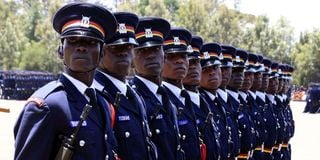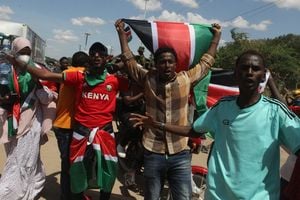Timeline of Kenya Police deployment to Haiti

In this file photo, police recruits march during a passing-out parade at Kiganjo Training College in Nyeri County. Port-au-Prince says it is still hoping to receive Kenya police.
What you need to know:
- October 6, 2022: Prime Minister Ariel Henry in a televised address calls on the international community to help fight the humanitarian crisis his country was facing.
- May 17: Thirdway Alliance party leader Ekuru Aukot files an application in court asking that the government to be held in contempt over plans to send 200 police to Haiti. He says the government has disobeyed High Court judge Chacha Mwita's January 26 order barring the deployment of police officers to the country.
Kenya’s mission to Haiti has been in the news for almost a year now. A specially trained contingent of 1,000 police officers is to be sent to Haiti, where armed gang violence continues to escalate.
The United Nations Security Council approved the deployment of a multinational mission to support Haiti in October 2023.
Other countries that have formally agreed to provide personnel are Antigua and Barbuda, the Bahamas, Bangladesh, Barbados, Benin, Chad and Jamaica.
The mission is expected to support the efforts of the Haitian national police in restoring security and peace in the country.
The Nation Research gives you a timeline of major events around the Haiti police deployment;
October 6, 2022: Prime Minister Ariel Henry in a televised address calls on the international community to help fight the humanitarian crisis his country was facing.
July 29, 2023: Kenya through former Foreign Affairs CS Alfred Mutua announces that it is prepared to deploy 1,000 police officers to Haiti.
August 1: US pledges to support a multinational police force led by Kenya to be deployed in Haiti.
September 29: Inspector General of Police Japhet Koome says police officers were ready for Haiti’s gangs and would succeed. "Yes, we're going to Haiti. We will lead this mission. We have never failed. We'll succeed there too," he said.
October 3: US President Joe Biden thanks President William Ruto in a 30-minute telephone conversation for Kenya's agreement to lead a UN-backed multinational security mission in gang-ridden Haiti.
October 2: The UN Security Council endorses the deployment of the Multinational Security Support (MSS) Mission to Haiti, paving the way for Kenya to send its troops to the country.
October 9: Court blocks deployment of police officers to Haiti, following a petition filed by Thirdway Alliance party leader Ekuru Aukot and others.
October 13: Cabinet approves police deployment to Haiti.
December 30, 2023: Parliament approves the deployment of police officers to Haiti.
January 26, 2024: High Court bars police deployment to Haiti ruling that only members of the Kenya Defence Forces (Kenya Army, Kenya Airforce and Kenya Navy) can be deployed to keep the peace outside Kenya.
February 13: Chief Inspector Walter Nyankieya Nyamato, a police officer on the advance security team dispatched to Haiti on a reconnaissance mission ahead of the planned deployment is found dead in his hotel room in Washington DC.
February 29: The Bahamas, Bangladesh, Barbados, Benin and Chad formally notify the United Nations of their intent to contribute personnel to the mission to Haiti. Benin says it will send 1,500 troops. Others who have pledged support are Jamaica who plan to send 170 soldiers and 30 police and Antigua and Barbuda.
February 29: Prime Minister Ariel Henry lands in Nairobi for talks on the deployment of police officers to Haiti.
March 1: Kenya and Haiti sign an agreement on the deployment of 1,000 police officers.
March 3: Hundreds of prisoners escape from the National Penitentiary in the Haitian capital city. The de facto government issued a 72-hour state of emergency and imposed night curfews.
March 5: Prime Minister Ariel Henry lands in Puerto Rico after his visit to Kenya after failing to be able to land in Haiti due to escalated violence.
March 11: Interior Cabinet Secretary Kithure Kindiki reaffirms 1,000 police officers will be deployed to Haiti. "We are now in the pre-deployment phase. All the other programmes are in place including the Status of Forces Agreement and the arrest and detention laws and other enforcement measures are now in place," he said.
March 11: US Secretary of State Antony Blinken announced the United States was increasing its pledge to the Haiti mission to $300 million. The money would go toward equipment for the force, training, personnel kits, uniforms and humanitarian support.
March 12: Prime Minister Ariel Henry stranded in Puerto Rico pledges to resign as soon as a transition council and temporary leader were chosen. Foreign Affairs Principal Secretary Korir Sing’oei says Kenya’s deployment of its police officers to Haiti would be delayed following Prime Minister Henry’s resignation.
March 15: Some US lawmakers block critical funding for Haiti mission warning the US administration needed "a lot more details" before it gets more funding.
May 12: US military sets up base where Kenya police will be operating from in Haiti.
May 16: It is revealed that the first batch of 200 officers will be arriving in Haiti by May 23.
May 17: Thirdway Alliance party leader Ekuru Aukot files an application in court asking that the government to be held in contempt over plans to send 200 police to Haiti. He says the government has disobeyed High Court judge Chacha Mwita's January 26 order barring the deployment of police officers to the country.
Compiled by: Jackline Macharia





